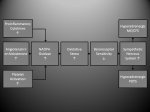Other considerations would be that angiotensin II blockade like Losartan will work better chronically than in the short term in theory.
However, other researchers have noted the elevated angiotensin II levels in POTS and do not at this stage believe an NO based mechanism is at play, rather there is resistance to angiotensin II from unresponsive ANg II receptors in the vascular bed but not interestingly in the kidney or other targets. As Ang II is a vasoconstrictor, this unresponsiveness results in increased NE and sympathetic activity to compensate for this unresponsive vasoconstriction. So here the mediator is no NO or reduced nNOS activity, but rather unresponsive ANG II mediated vasoconstriction perhaps from desensization because of chronic elevated ANG II levels.
Vandebilt had a new paper published just days ago in regard to Angiotensin II and the lack of vascular response to angiotensin II infusion. This paper specifically talks about baroreflex abnormalities associated with elevated ANg II so may be of interest.
Another potential mechanism could be autoantibodies clogging up ANG II receptors although this is speculative - however these have been found in a number of other pathologies such as preeclampsia, etc.
Therefore, potentially NO supplementation may not have any benefit in any cases. I know from patients that have dosed with L-arginine and other substrates that have attempted to increase NO bioavailability the results seem to follow a similar course: a rapid improvement and then a severe crash after a short period.
Some patients do report benefit from Taurine and a few other supplements that might work indirectly on eNOS and nNOS bioavailability so its hard to say.
Laslty a few patients have reported that nitroglycerine during an autonomic storm (a severe exaccerbation of POTS with body shakes and mental confusion) improves them dramatically.
It could even be that NO levels are abnormal in some areas - such as splanchnic circulation hyperactivation, thoratic or cerebral reduced.
thank you for your posts - they were refreshingly well researched.

